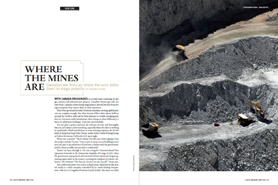 WITH CANADA RECOGNIZED as a world leader in mining, oil and gas, nuclear and infrastructure projects, Canadian lawyers get calls not only from Canadian clients doing mega projects abroad, but also from foreign enterprises that want to draw on their experience.
WITH CANADA RECOGNIZED as a world leader in mining, oil and gas, nuclear and infrastructure projects, Canadian lawyers get calls not only from Canadian clients doing mega projects abroad, but also from foreign enterprises that want to draw on their experience.
That’s both good and stressful. Domestic mandates on mega-global projects are complex enough. But when lawyers follow their clients halfway around the world to look out for their interests in volatile emerging markets (or even more stable jurisdictions where things are done differently), it layers on additional challenges. And some are minefields.
You can plan a project and asses the risks pro-actively and thoroughly, but you can’t always catch everything, especially when the client is working in a politically volatile jurisdiction, as many mining companies do. It’s the kind of thing that keeps John Turner, leader of the Global Mining Group at Fasken Martineau DuMoulin LLP, up at night.
Worst-case scenario? “There’s always the risk your client’s going to lose the project entirely,” he says. “Once you’re in the process of building a mine you can’t pick it up and move it if you have a dispute with the government, and it’s always possible you can have it confiscated.”
Turner has been through it. He was acting for Vancouver-based First Quantum Minerals in the Democratic Republic of Congo in 2011 when the government expropriated and nationalized First Quantum’s largest operating copper mine in the country, accusing the company of contract violations. The violation? “The date on a licence was one day off,” Turner says.
The confiscated mine was sold to a third party, identified in the British media as a shell company controlled by an Israeli mining entrepreneur with ties to Congolese President Joseph Kabila. The mine was fairly quickly sold on to rival Eurasian Natural Resources Corporation PLC, known as ENRC, a company listed on the London Stock Exchange.
First Quantum filed an international arbitration against the Congolese government, and a lawsuit against the third-party company in the British Virgin Islands, Turner says. With mainstream British media picking up on the Canadian miner’s insistence that ENRC was dealing in stolen property, the London-based company’s reputation started to take a hit. The case settled in 2012.
“We ultimately received US$1.25 billion, which was what the asset was worth, from ENRC. It was a win in the sense that people expected we wouldn’t get any compensation or very little compensation, and on that basis we recovered what it cost to build the mines. Obviously, we would have preferred to keep operating them but we basically got our money back.”
Can you mitigate against this type of political risk? You can, he says, and the best way to do so involves bringing in multilateral agencies such as Export Development Canada or the World Bank’s International Finance Corporation to partner in some capacity.
“There’s obviously a huge government-relations aspect,” and so being proactive about engaging with local non-governmental organizations as well as with all levels of government on the ground, and making sure they understand the project and are onside, is critical. Because simply refusing to do business in jurisdictions that present volatile political risk isn’t a viable option for large international miners.
John Sabine, now counsel to Bennett Jones LLP, with many years of experience working on such projects, says large mining companies have to go where the deposits are, whether they be in the People’s Democratic Republic of the Congo, Venezuela, Zimbabwe, Argentina or Tanzania.
“Mineral grades are huge, there’s an abundance of copper, most metals, particularly in Africa right now — Congo in particular — has a tremendous amount of cobalt; about 70% of the world’s production comes from Africa,” Sabine says. “So what you’re trading off is the accessibility to high-grade large resource projects in exchange for the peripheral things you wouldn’t normally expect in Canada or the United States where we have the rule of law, a ban on corruption and we have transparency.”
Depending on the jurisdiction, Sabine says, there may be some upsides to doing mega projects there along with the potential risk.
“You face reduced risk of environmental issues and probably face less risk of constraints on your ability to operate in a circumstance where you have mining laws that are less rigorously enforced. On the other hand, you face the issues of government competency, government corruption, taxation.”
Sabine points to Tanzania, which hit UK-based Acacia Mining, majority owned by Canada’s Barrick Gold, with a US$190-billion bill for taxes and fines last year for allegedly operating in the country illegally and supposedly failing to fully disclose its export earnings over 17 years. The amount equals two centuries worth of revenue.
Foreign anti-corruption laws imposed on American, Canadian and many EU companies “pose additional challenges” to doing mega projects in jurisdictions where additional payments to key figures are the norm and the host government has a different view of business practices. Sabine says another factor that has to be taken into consideration, regardless of political climate is infrastructure — or complete lack of it.
“You have to effectively frequently build your own infrastructure. You have to build a community, build and staff schools, medical facilities, provide drinking water. … We’ve had problems in Central Africa because we couldn’t source electrical power. We were doing a copper project that requires power so sometimes you have to build your own power plant or you can negotiate with the government to get the power and they have to supply it. And frequency they can’t. I know one deal where we effectively paid to build a sub-station with another mining company, and as the thing came to fruition the government required us to give up 10% of the power output for use by the city. Which is fine, it’s just there are always little surprises along the way.”
In fact, the little surprises can be the biggest challenge, says Alain Massicotte, head of the Montréal Infrastructure and P3 Group at Blake, Cassels & Graydon LLP.
Massicotte says as lawyers, the biggest challenge is to make sure you identify all the risks “then making sure all the risks are mitigated correctly” before the documentation is drawn up and signed.
What keeps it interesting is the risks are different in each country: and sometimes impossible to foresee. Yet they are critical to the client and to the project.
For example, he says, he was working on an independent power project in India some years ago negotiating a power purchase agreement with the government’s state energy board when something completely unexpected happened: neighbouring Pakistan carried out a nuclear test.
In project finance, he says, the infrastructure must be built within budget and completed by a certain date because the client is paid after the commissioning. If construction is delayed because of external events, the private partner has to be indemnified because they can’t meet obligations. So after the nuclear test, “now we had to negotiate the supervening-events clauses. What happens if the international community decides to establish an embargo against Pakistan and it has an ancillary effect on India? It’s a question of risk assessment. Had an embargo or sanctions been placed on Pakistan it could have delayed the Indian mega projects or raised costs because of an indirect impact on the supply of material, the financing or the general political environment in the region.”
Massicotte, who has done a lot of work in sub-Saharan Africa, says there are many other types of risk as well as this type of geopolitical risk: there is regulatory risk, authorization risk, administrative risk and, again, the risk you don’t know about yet.
Ilan Dunsky, national co-chair of Dentons Canada LLP’s Infrastructure and PPP group, says risks of delay on large infrastructure mega projects abroad can make the cost of the project “easily twice those of a similar project in Canada.”
And every now and then, they can make things for the lawyer quite uncomfortable.
Dunsky — who’s done scores of mega projects abroad for project sponsors, foreign governments and third parties such as engineering firms — was hired a few years ago by the airport authority of an African country, which he preferred not to name, to audit the process that resulted in the awarding of the right to design build, finance and operate a new airport, “one of the busiest airports in Africa,” to a local private company majority owned by the son of the president.
“It was a big deal, about US$1 billion in investment,” Dunsky says. The project was structured so that the private company would turn around and subcontract everything to a foreign company that would actually design, build, finance and operate the new facility.
“The challenge was to see if there was any legitimacy to the structure,” Dunsky says. When he went through all the contracts, he says, it became apparent the two-step structure “was just a way to shovel money, or funnel money, through that local company first.”
That put Dunsky in an awkward position. “I was supposed to make a report on whether this was a legitimate structure but I was still in the country, so I was afraid to submit it while I was there. So basically, I spent a few days at the hotel. I went to the swimming pool, I had nothing else to do, and left the country on the date I was expected to leave. Then, I submitted my report.”
The contract was cancelled, “so my report was taken seriously by the government or whoever ultimately decided.” That’s important to note, he says, because politically unstable jurisdictions often have different factions, “and it’s often not the government that’s corrupt, it’s one faction or another.”
Dunsky says one of the first things he tells clients working on a mega project in these types pf countries is “make sure they’re dealing with the right people. You might be dealing with the people who, on paper, have all the authority to enter into the contract with you. But they may not actually have the true authority.”
The way for clients to protect themselves is to have reliable contacts on the ground, whether local law firms, local engineering firms, or even “fixers,” business consultants who know the lay of the land and help foreigners navigate through the minefield of dealing there. “You can’t just walk into a country and say: ‘I’m going to build an airport here.’”
Like Sabine, Dunsky says the anti-corruption regimes of Canada, the US, the EU and most of the G7 countries put Canadian companies at a relative disadvantage to companies from other countries not similarly bound, “although less so [in infrastructure] than in mining.”
“Corruption is endemic in some of these countries, and some are worse than others, and our clients — not that they want to pay bribes, they don’t want to — but they sometimes can’t do business in those countries without conforming to local business practices that may not conform to Canadian legal requirements, to which Canadian companies want to strictly adhere.
Jody Aldcorn, who does a lot of infrastructure and project finance work in the Vancouver office of McCarthy Tétrault LLP, says “this is one of the areas where Canadians are kind of [good scouts], and, in my experience, there are very strict policies in place. It probably wouldn’t be any surprise to most people that in the airport-procurement space, given these are very large and lucrative projects, there’s the potential for there to be undue influence.”
Aldcorn is often lead counsel for Vantage Airport Group Ltd., which are international airport operators. That means when new airports are being built they are part of a consortium and, especially in unfamiliar parts of the world, Aldcorn says the client has to pay very close attention to the other partners, “which is something I worry less about here in Canada. I’ve had to go through that with my client because there’s always potential issues, or for the optics of an issue.”
Even international projects in more politically stable parts of the world (Aldcorn has worked on large airport projects in the Bahamas, Chile, Honduras, the UK and the US) have challenges.
While Vantage is Canadian, it can be building an airport in the Caribbean or South America with a Spanish sponsor, and the way the parties negotiate, the language issues and cultural differences, can be at play in negotiations — even though the differences aren’t always immediate apparent. “Understanding what they really want can sometimes be difficult,” Alcorn says. So is it fair to say what she doesn’t know is the thing that trouble her the most? “Absolutely.”
When the client or a major party that has never done this kind of project before, it brings its own set of challenges that can be troubling if not handled properly The risk of delay on a giant infrastructure mega project can send the deal wrong in a hurry, says Ahab Abdel-Aziz, the global director of the nuclear power generation practice group at Gowling WLG.
When Moscow-based Rosatam, Russia’s State Atomic Energy Corporation, was invited to submit a proposal to construct the largest new-build nuclear power construction project in the world, the US$30 billion El Dabaa project in Egypt, it used Gowling WLG as its principal legal counsel and it won the bid.
Toronto-based Abdel-Aziz, who was also the Rosatom project director, says this was Egypt’s first foray into nuclear power generation with multiple reactors, “and it was a huge project for the first time. I think more than anything, that was the thing I hadto keep my eye on, as did the rest of the team.”
Abdel-Aziz says that made it really important to help Egyptian government and the client understand that “there was effectively a third entity in the room that everybody needs to be aligned with — and that’s the success of the project. And that means you might do things differently than in a more traditional confrontational negotiation. “We tried to make sure everyone understood that sometimes when you win a point in this type of negotiation, ultimately you may lose because you do it at the expense of the project.”
The negotiations were extensive. Gowling WLG helped negotiate the engineering, procurement and construction contract, the operations support and maintenance contract, and the nuclear fuel supply and the spent nuclear fuel (or nuclear waste) contract. The legal team also provided strategic advice on risk management, project delivery, regulatory and licensing requirements and nuclear liability using some lawyers on the ground in Cairo as well as some back in Canada.
Several of the negotiating teams were huge, involving 20 people from each side, with 40 or more people around the table, Abdel-Aziz says. The stakes were pretty big, too. The El Dabaa project is the type of project, he says, that presents significant project risk and like any large infrastructure project, “when things go sideways, the consequences are staggering in terms of the economic value and policy implications.”
In nuclear projects, unlike conventional power projects, the lion’s share of investment is up-front capital costs, so a lengthy delay can lead to debilitating interest costs as well as the cost of the massive overhead, the committed resources and the project team, both of which sit idle “testing the ability of the parties to absorb the additional cost and keep the project going.”
It was a test the negotiators passed. In December, Egyptian President Abdel-Fattah El-Sisi and his Russian counterpart, Vladimir Putin, met in Cairo to sign an agreement officially launching work. The negotiations were a success.
Helping clients manage complex international mega projects is a high-stakes high-intensity workout for the lawyers behind the scenes, but Abdel-Aziz and others say it’s never dull and for all the stress, when things work well as they did in El Dabaa and on scores of other such projects, there’s nothing they’d rather be doing.




